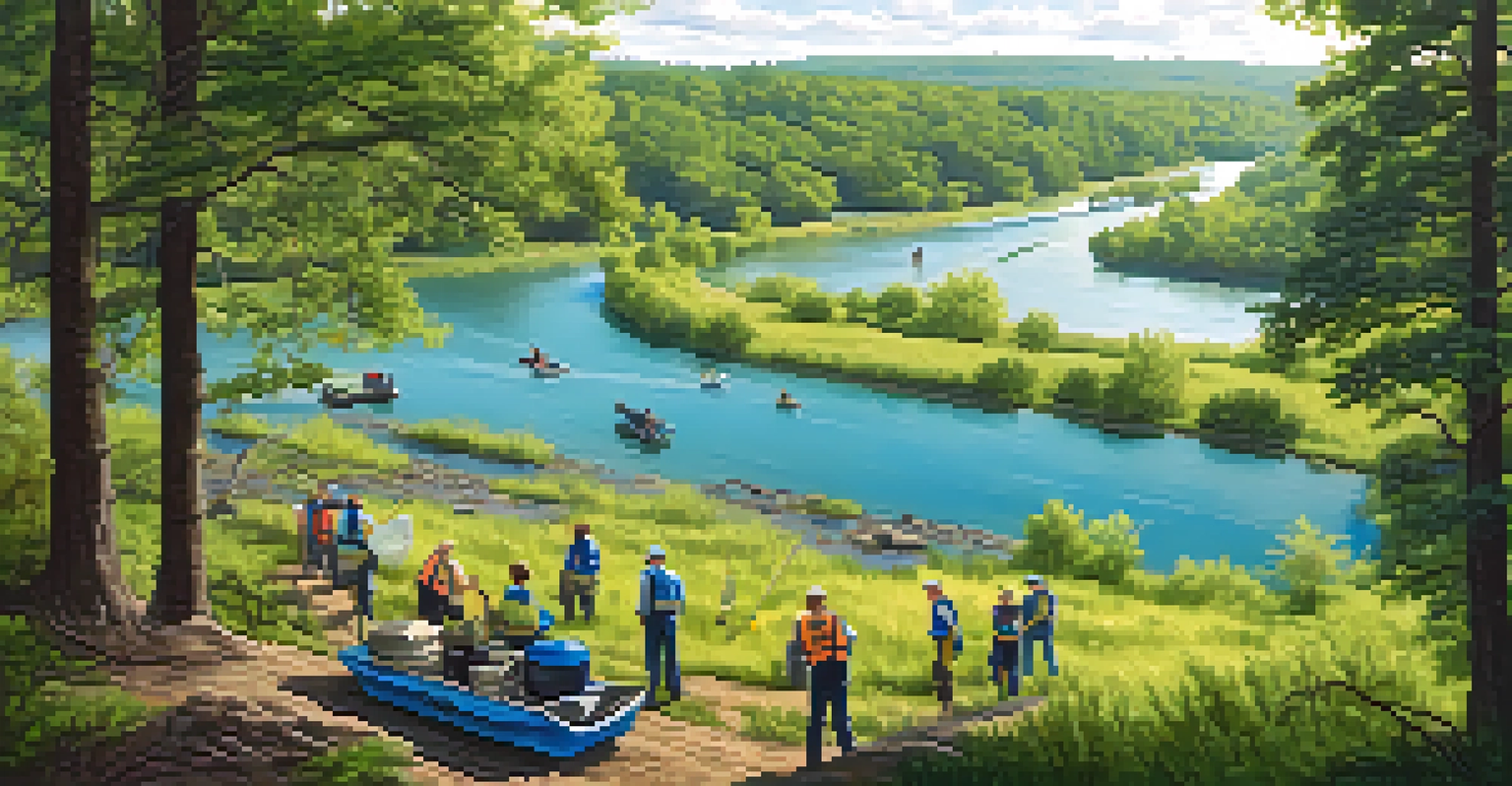Preserving Tennessee’s Rivers: Challenges and Solutions

Understanding the Importance of Tennessee’s Rivers
Tennessee's rivers are more than just waterways; they are lifelines for ecosystems, communities, and economies. These rivers support diverse wildlife, provide recreational opportunities, and are crucial for agriculture and industry. However, their health directly impacts the quality of life for residents and the environment.
Rivers are the arteries of our planet; they are the lifeblood of ecosystems and human communities alike.
The Tennessee River, for instance, is a vital source of drinking water for millions and a popular destination for fishing and boating activities. The winding waterways also contribute to the state's rich cultural heritage, making them integral to Tennessee's identity. Protecting these rivers means safeguarding our natural resources and preserving a way of life.
Yet, despite their significance, these rivers face numerous threats that could compromise their health and vitality. From pollution to habitat destruction, understanding the importance of these waterways is the first step in ensuring their preservation for generations to come.
Identifying Key Challenges Facing Tennessee’s Rivers
One major challenge impacting Tennessee’s rivers is pollution from various sources, including agricultural runoff, industrial waste, and urban development. This contamination can lead to toxic algae blooms, fish kills, and unsafe water for recreational use. Understanding the sources of pollution is crucial for formulating effective strategies for cleaning up these vital waterways.

Moreover, habitat destruction due to damming, dredging, and land development poses a significant concern. These activities disrupt the natural flow of rivers and can lead to erosion and loss of biodiversity. The delicate balance of river ecosystems is threatened when habitats are altered or destroyed, emphasizing the need for conservation efforts.
Rivers Are Vital to Tennessee's Life
Tennessee's rivers play a crucial role in sustaining diverse ecosystems, providing drinking water, and supporting recreational activities.
Climate change also presents a pressing challenge, as rising temperatures and unpredictable weather patterns impact river health. Increased flooding and drought can have devastating effects on both wildlife and human populations that rely on these waterways. Acknowledging these challenges is essential for effective river conservation.
The Role of Community Engagement in River Conservation
Community involvement is key to preserving Tennessee’s rivers. Local residents often have the most intimate knowledge of their surrounding environments, making their insights invaluable for conservation efforts. Engaging communities fosters a sense of stewardship, encouraging individuals to take an active role in protecting their local waterways.
The health of our rivers is a reflection of our commitment to protecting the environment and ensuring a sustainable future.
Organizations such as the Tennessee Riverkeeper exemplify the power of grassroots efforts in advocating for river health. They work tirelessly to educate the public about pollution impacts and organize clean-up events, which not only help restore the rivers but also build community spirit. When people come together for a common cause, the collective impact can be profound.
Additionally, schools and local organizations can integrate river-focused education into their programs, cultivating environmental awareness from a young age. By empowering the next generation with knowledge and skills, we can ensure a continued commitment to preserving Tennessee’s rivers for years to come.
Legislation and Policy Changes for River Protection
Effective legislation is vital for the protection of Tennessee's rivers. Policies that regulate pollutant discharges, enforce land use planning, and promote sustainable agricultural practices are essential to maintaining the health of these waterways. Advocacy for sound environmental policies can lead to significant improvements in water quality and habitat restoration.
One notable example is the Clean Water Act, which has been instrumental in regulating water pollution across the United States. Ensuring that local and state regulations align with federal standards can help strengthen protections for Tennessee’s rivers. Ongoing dialogue between lawmakers and conservationists is necessary to address emerging threats and adapt regulations accordingly.
Pollution Threatens River Health
Various sources of pollution, along with habitat destruction and climate change, pose significant challenges to the health of Tennessee's rivers.
Moreover, fostering partnerships between government agencies and non-profit organizations can enhance conservation efforts. Collaborative initiatives can lead to innovative solutions and mobilize resources to tackle river protection challenges more effectively. Together, we can create a robust framework for safeguarding our rivers.
Innovative Solutions for River Restoration
As we confront the challenges facing Tennessee's rivers, innovative solutions are emerging to restore and protect these critical ecosystems. One promising approach is the use of green infrastructure, which integrates natural processes into urban planning. This can include creating rain gardens, permeable pavements, and restored wetlands that help filter pollutants before they reach the waterways.
Another effective strategy involves implementing water quality monitoring programs that engage local volunteers. These citizen scientists can collect data on river health, providing valuable insights to inform conservation efforts. By harnessing technology, such as online platforms for reporting pollution, communities can work together to address issues more swiftly.
Additionally, habitat restoration projects, like replanting native vegetation along riverbanks, can enhance biodiversity and improve water quality. These efforts not only benefit wildlife but also create beautiful, functional spaces for the community to enjoy. Through innovation and collaboration, we can turn the tide for Tennessee’s rivers.
The Impact of Education on River Conservation
Education plays a pivotal role in fostering a culture of conservation for Tennessee's rivers. By raising awareness about the importance of these waterways, we can inspire individuals to take action to protect them. Educational initiatives can range from workshops and seminars to school programs that teach students about the ecological and cultural significance of rivers.
For instance, programs that include field trips to local rivers allow students to connect with their environment firsthand. These experiences can ignite a passion for conservation and encourage lifelong stewardship. The more people understand their local ecosystems, the more likely they are to advocate for their protection.
Community Engagement Fuels Conservation
Local community involvement is essential for river conservation, fostering stewardship and empowering individuals to protect waterways.
Furthermore, integrating river conservation topics into broader environmental education can create a more informed and engaged public. When communities are equipped with knowledge about the challenges facing their rivers, they are better positioned to support policies, participate in clean-up efforts, and foster a culture of care for these vital resources.
The Future of Tennessee’s Rivers: A Collective Responsibility
The future of Tennessee’s rivers relies on a collective commitment from individuals, communities, and organizations alike. While challenges abound, the solutions are within our reach if we work together. Each of us has a role to play in advocating for clean water, restoring habitats, and supporting sustainable practices.
As we look ahead, it’s essential to maintain momentum by staying informed and engaged in local conservation efforts. Whether participating in community clean-ups, supporting legislation, or educating others, every action contributes to the larger goal of preserving our rivers. The cumulative effect of these small efforts can lead to significant positive change.

Ultimately, the health of Tennessee’s rivers is a reflection of our values as a society. By prioritizing the preservation of these essential waterways, we not only protect our natural heritage but also ensure a vibrant and sustainable future for generations to come.